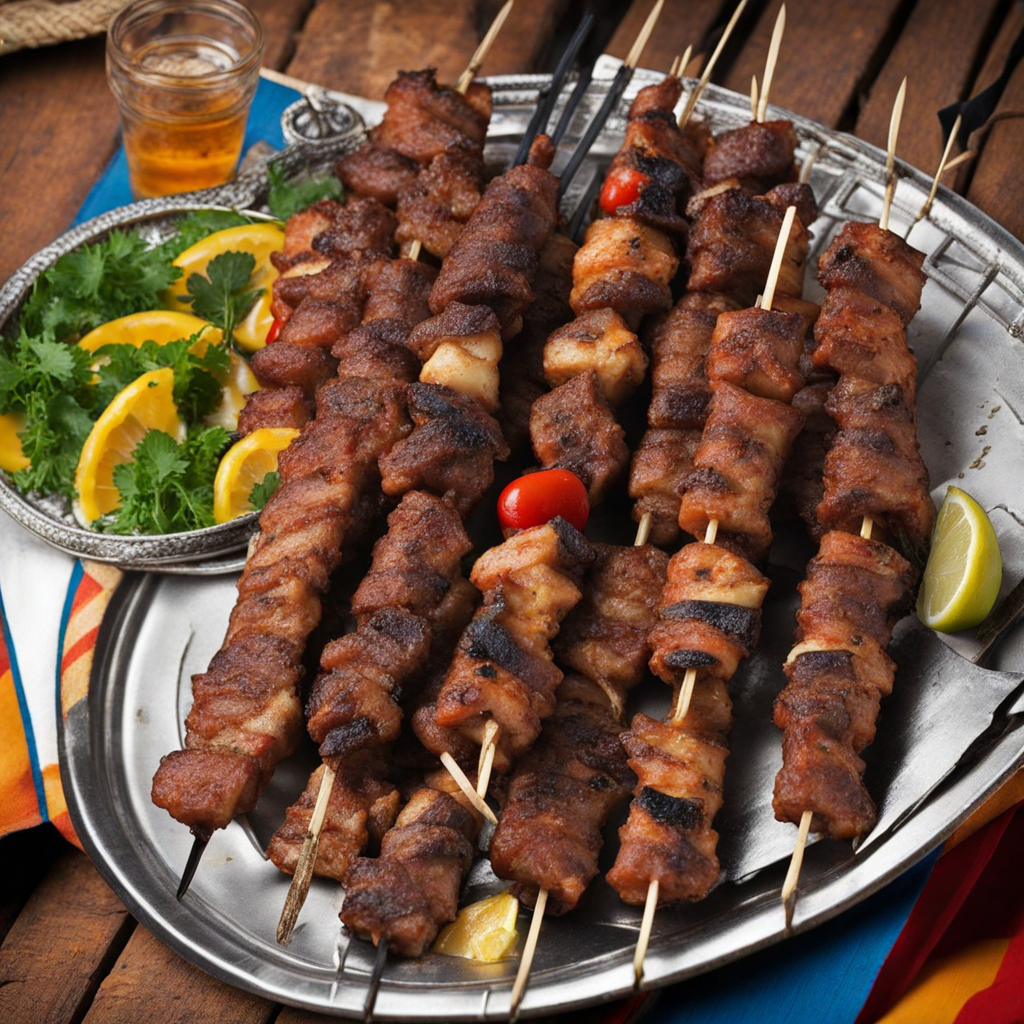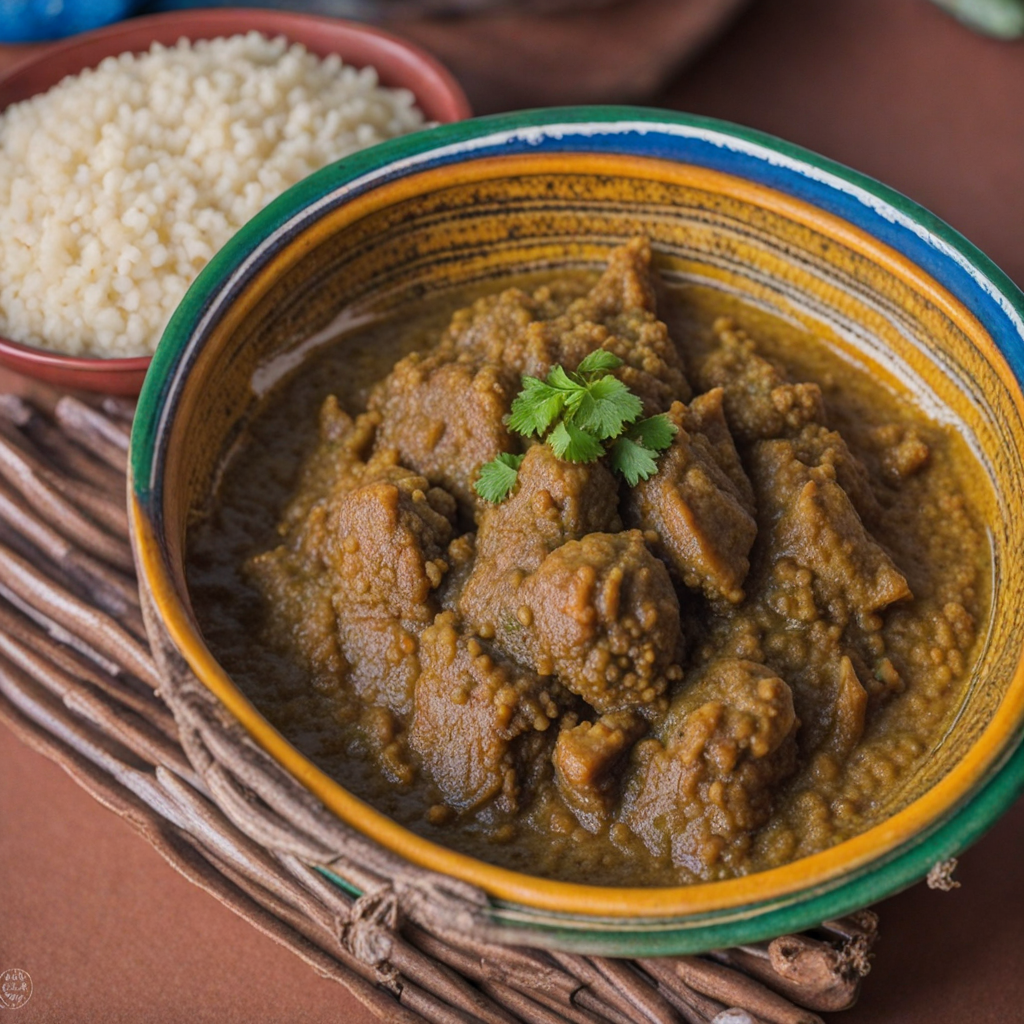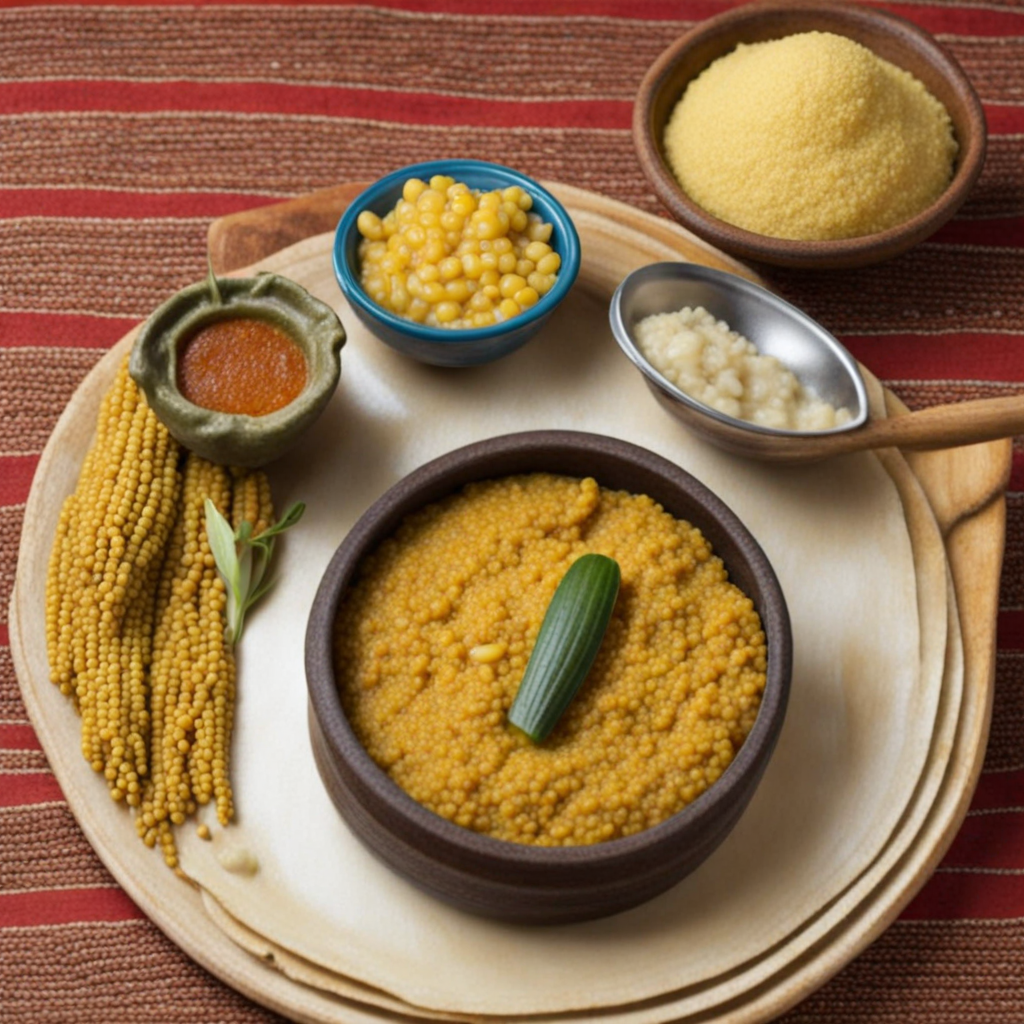Brochettes
Brochettes are a delightful street food from Burkina Faso that captures the essence of West African flavors. These skewers typically feature marinated pieces of meat, often goat, beef, or chicken, which are seasoned with a blend of local spices and herbs. The marinade usually includes ingredients like garlic, ginger, and a touch of chili, giving the meat a savory and subtly spicy profile. The skewers are then grilled over an open flame, imparting a smoky flavor that enhances the natural richness of the meat, making each bite a burst of flavor that is both hearty and satisfying. In addition to the traditional meat options, brochettes can also include a variety of vegetables such as bell peppers, onions, and tomatoes, which add a colorful and nutritious element to the dish. The vegetables are often marinated along with the meat, absorbing the same aromatic spices. This combination not only elevates the taste but also offers a textural contrast that is delightful; the charred exterior of the grilled ingredients provides a satisfying crunch, while the inside remains juicy and tender. Brochettes are usually served with a side of spicy sauce or a tangy dipping sauce, and they are often accompanied by a portion of rice, couscous, or a fresh salad. The communal nature of enjoying brochettes, often shared among friends and family, adds to the experience, making it a popular choice for gatherings and celebrations. Discovering this dish allows you to explore the vibrant culinary landscape of Burkina Faso, where every bite tells a story of tradition, community, and the rich flavors of the region.
How It Became This Dish
The History of Brochettes in Burkina Faso: A Culinary Journey #### Origins and Early Beginnings Brochettes, a term that refers to skewered and grilled meat, have their roots deeply embedded in the culinary traditions of many cultures around the world. In Burkina Faso, this delightful dish reflects the country’s rich history, diverse ethnic groups, and the influence of geographic factors that shape its culinary landscape. The concept of grilling meat on skewers is not unique to Burkina Faso; it is a practice that can be traced back to ancient civilizations. However, in the context of Burkina Faso, brochettes have evolved into a distinct dish that showcases local flavors and ingredients. Traditionally, the dish is made from various meats, including beef, goat, chicken, and even fish, marinated with a blend of spices and herbs that are characteristic of West African cuisine. The origins of brochettes in Burkina Faso can be linked to the broader West African culinary practices, where communal cooking and sharing of meals are integral to social life. The nomadic Fulani people, known for their herding and pastoral lifestyle, contributed significantly to the development of grilled meat dishes. They often prepared skewered meat over open flames during their travels, which not only provided nourishment but also became a centerpiece for gatherings and celebrations. #### Cultural Significance In Burkina Faso, brochettes are more than just a meal; they are a symbol of community, hospitality, and celebration. The act of grilling meat on skewers is often associated with communal gatherings, family reunions, and local festivities. Street vendors, known as “maquis” or “buvettes,” populate urban areas, serving hot brochettes to hungry patrons. These bustling stalls are not only places to enjoy delicious food but also vibrant social hubs where people come together to share stories and laughter. The preparation of brochettes often involves a ritualistic approach, where family members collaborate to marinate the meat and prepare accompanying side dishes like rice, plantains, or a spicy sauce made from tomatoes, onions, and peppers. This collaborative process reinforces social bonds and emphasizes the importance of shared meals in Burkinabé culture. Moreover, brochettes are often enjoyed during significant life events, such as weddings, birthdays, and religious celebrations. The dish transcends mere sustenance; it embodies the values of generosity and togetherness, serving as a means to forge connections among people. It is customary for hosts to offer brochettes to guests as a gesture of welcome and goodwill, making it a staple in the hospitality culture of Burkina Faso. #### Development Over Time As Burkina Faso has undergone social, economic, and political changes, so too has the dish of brochettes evolved. The country, which gained independence from France in 1960, has seen a remarkable transformation in its culinary practices, influenced by globalization, urbanization, and the migration of people. In the past, brochettes were primarily prepared at home or in rural areas, utilizing locally sourced ingredients. However, with the rise of urban centers like Ouagadougou and Bobo-Dioulasso, brochettes began to take on a new form. Street food culture blossomed, and the demand for convenient, flavorful meals surged. This led to the proliferation of specialized brochette vendors, who honed their craft and introduced innovative variations of the dish. One notable development in the preparation of brochettes is the incorporation of new flavors and cooking techniques. While traditional recipes remain popular, modern chefs and street vendors have begun experimenting with marinades that blend local spices with influences from global cuisines. Ingredients such as peanut butter, ginger, and citrus have found their way into marinades, giving the dish a unique twist. Additionally, the preparation of brochettes has expanded to include vegetarian options, catering to a diverse range of dietary preferences. The globalization of food culture has also led to increased exposure to international culinary trends. As Burkinabé people travel and interact with different cultures, they bring back new ideas and techniques that enrich the local food scene. This exchange has resulted in creative fusions, where brochettes are served with sides inspired by other cuisines, such as French fries or salads, creating a delightful blend of flavors. #### Challenges and Resilience Despite its popularity and significance, the brochette industry in Burkina Faso faces challenges, particularly related to food security and economic stability. The country has experienced periods of drought, conflict, and economic hardship, which can impact the availability of key ingredients. However, the resilience of the Burkinabé people shines through in their ability to adapt and innovate. Local farmers are increasingly focusing on sustainable practices to ensure a steady supply of quality meat and produce. Community-supported agriculture initiatives have gained traction, allowing consumers to connect directly with farmers and support local economies. This shift not only enhances food security but also reinforces the cultural importance of supporting local food systems. Moreover, as awareness of health and nutrition grows, there is a rising trend towards using organic ingredients and reducing reliance on processed foods. Many vendors are beginning to embrace these practices, offering healthier versions of brochettes that prioritize fresh, locally sourced ingredients. #### Conclusion The story of brochettes in Burkina Faso is one of cultural significance, communal bonds, and culinary evolution. From its humble origins rooted in the traditions of the Fulani people to its present-day status as a beloved street food, brochettes embody the essence of Burkinabé hospitality and resilience. As the world continues to change, brochettes will undoubtedly adapt, reflecting the dynamic landscape of Burkina Faso's culinary heritage. Whether enjoyed at a bustling street stall or at a family gathering, brochettes remain a cherished dish that unites people through the joy of sharing good food and creating lasting memories. In every skewer grilled to perfection, there lies a story of tradition, innovation, and the enduring spirit of community.
You may like
Discover local flavors from Burkina Faso







